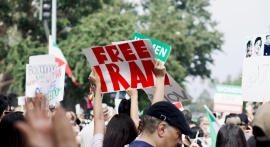
Easter is the day when concluding the week full of religious traditions and observances, and millions of Orthodox Christians from Eastern and Southern Europe, the Middle East, and other regions of the world have gathered to celebrate.
Easter is observed outdoors and includes both intensely spiritual and prehistoric pagan components. It is the most important festival in the Orthodox calendar. Religious services are held during the celebrations, and then a meal is shared with friends and family.
Easter Traditions Are Changing, Blending Tradition and Thrills While Raising Public Safety Issues
According to the article shared in Associated Press News, it's possible that customs like enjoying spit-roasted lambs, competing with red-dyed hard-boiled eggs, and lighting rockets off when the priest declares that our Lord Jesus Christ has already been brought back from the dead at midnight on Saturday predate Christianity itself. New traditions have developed over time, and older ones have been modified, keeping the holiday alive and constantly changing.
Young churchgoers in the Neos Kosmos neighborhood of Athens, Greece, have recently started flinging Molotov cocktails into open areas during Easter celebrations. Thousands of flares are fired at each other in a "rocket war" between two opposing groups in the village of Vrontados on the island of Chios. More peace-loving residents are anxious because of previous house fire incidences.
Local government has a problem because these unusual traditions attract attention and tourists while raising questions about public safety. Due to the COVID-19 outbreak, this year's event was less intense; according to state TV ERT, "only" 20,000 flares were shot. A documentary crew documented the event, and the movie will be shown on the Viva Vision screen in Las Vegas, which holds the record for the largest video screen in the world.
Also Read: Russian Forces Strike Ukrainian Church on Easter Sunday, Leaving Two Dead
Greeks Embrace Easter Traditions Amid Travel Rush, and Global Reflection, Holy Fire Miracle Shared Worldwide
Easter is when many Greeks leave the busy city and return to their hometowns. According to ABC News, over 575,000 family-hauling vehicles left the Athens region this year. Authorities are bracing for the rush of returning drivers as the festivities come to an end, hoping they've had enough time to recover from any potential hangovers.
But Easter celebrations aren't only about having a good time. There were other serious occasions this year, such as celebrations in war-torn Ukraine. The occasion also invites meditation, like when Ecumenical Patriarch Bartholomew of Istanbul, regarded as "first among equals" among Orthodox Christian leaders, observed Easter in his native Gokceada (also known as Imvros in Greek), a Turkish island. This trip was delivered on a promise made ten years previously.
The Holy Fire, said by the faithful to have been miraculously lighted in the Church of the Holy Sepulchre in Jerusalem on Saturday, was distributed to many nations as it had been in past years. According to the Tribune-Democrat, these nations include North Macedonia, Bulgaria, Cyprus, Egypt, Georgia, Greece, Lebanon, Romania, Russia, Serbia, and Ukraine.
The Holy Fire is welcomed with the same acclaim usually given to visiting heads of state in many places. Every parish in Greece receives the Holy Fire before Saturday midnight, which is thought to be a miracle in and of itself.
Related Article: Ukrainian Official Alleges Russian Military Attacked Church on Orthodox Easter


















